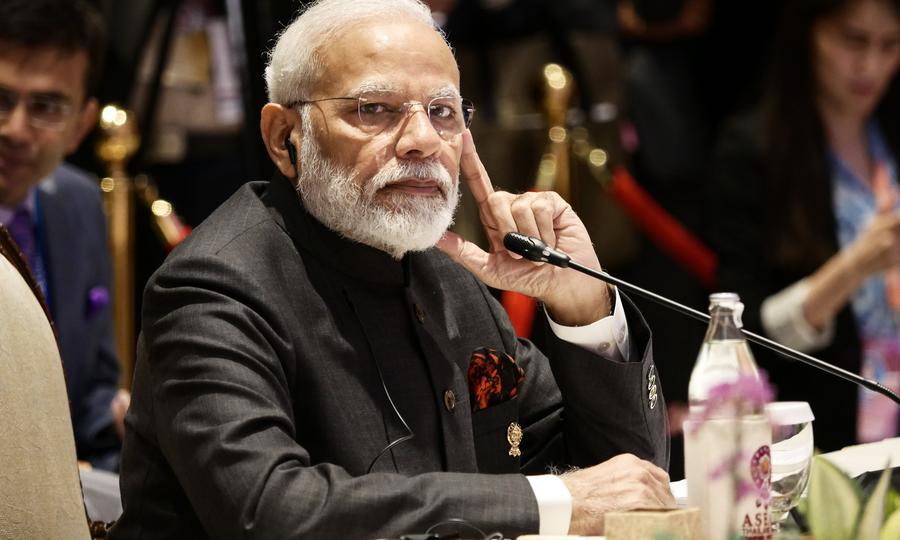By Challenging Status Quo,PM Modi Has Made Vested Interests Uncomfortable

The status quo position of the Indian secular-liberal political class was that while Hindu personal laws would be regularly modernised, Muslim personal laws would be left alone
by Akhilesh Mishra
The fact is that if there is a genuine dissenter in Indian politics today, it is Narendra Modi.
“Conformity may give you a quiet life; it may even bring you to a university chair. But all the change in history, all advance, comes from the nonconformists.”
In the context of the current debate on the importance and modes of dissent, these words of A J P Taylor, a renowned British historian and journalist, become doubly salient.
So, who is a dissenter in the present Indian political context? Conventional wisdom, manufactured by a well-oiled machine, would have us believe that all those who are opposed to Narendra Modi and his government are dissenters. But could the truth be something completely different? That it is Modi who is the real dissenter while all those protesting against him, creating mayhem in the streets, providing material for the screed against India in the Western press, are the status quoists? Let us look at some of the evidence.
The status quo position of the Indian secular-liberal political class was that while Hindu personal laws would be regularly modernised, Muslim personal laws would be left alone. If that meant depriving millions of Muslim women of basic gender rights that their other fellow citizens enjoyed, then so be it. However, came along dissenter Modi, and passed the Triple Talaq Bill.
The seven-decade long conformist position on Jammu and Kashmir was to “constitutionally enable separatism” by treating a temporary arrangement, Article 370, as a permanent millstone around India’s neck. But then came along dissenter Modi, who dared to do what was constitutionally correct by scrapping Article 370 and its even more pernicious cousin, Article 35A.
The settled conformist position of the Congress-led elites was that while none would dare publicly oppose a Ram Temple at his birthplace, every behind-the-scenes effort will be made to scuttle the aspirations of a billion Hindus. But dissenter Modi ended this game of subterfuge and enabled the Supreme Court to finally decide the case based on evidence. Unsurprisingly, the SC returned a unanimous verdict because of the overwhelming evidence in favour of a Ram Temple.
And then came the Citizenship Amendment Act (CAA) under dissenter Modi. This was the proverbial last straw. There was only so much dissent that those with a vested interest in maintaining every malignant status quo were willing to tolerate. The present-day politics of the Congress, especially under Sonia Gandhi, has turned so overtly Islamist that it could not countenance even a simple humanitarian act of providing citizenship to thousands of people persecuted based on their religion.
The CAA threatened to unravel the basic appeal of the Congress — as the last refuge of the Islamist agenda. What good was the Congress party, if the Islamist agenda was being defeated, and that too through constitutional means? This is the question that the leadership of Congress and other status quoists would have grappled with. And that is when decisions would have been made.
The CAA was passed by Parliament on December 11, 2019. And with electrifying speed, the top brass was mobilised. Sonia Gandhi, speaking at a political rally on December 14, 2019, gave the war cry of “iss paar ya uss paar ka faisla” (time to decide which side we are on).
The fact is that if there is a genuine dissenter in Indian politics today, it is Narendra Modi. We have long known what ails the Indian society, polity, and indeed, the Indian economy. But vested interests in each domain conspired to maintain the status quo. Maintaining the status quo is profitable. It can lead to a great international profile. Or lead to people receiving international awards. It even gets people personal university chairs. It used to mean getting huge amounts of bank loans without accountability. The price for maintaining this status quo has been paid by generations and generations of Indians, forced to live in an India of mediocre achievements as compared to her potential.
Modi could have chosen the same path — of being a conformist. It was certainly easier and perhaps for himself, it would have been a happier path as well. But, as A J P Taylor said, all advance in human history comes from the non-conformists. Modi is that non-conformist. Modi is that dissenter. All the forces of the status quo have ganged up against Modi to quash his dissent. With the “vote veto” being neutralised, the final weapon is now being tested — the “violence veto”. Who prevails will determine what kind of India we have by the end of this decade.




